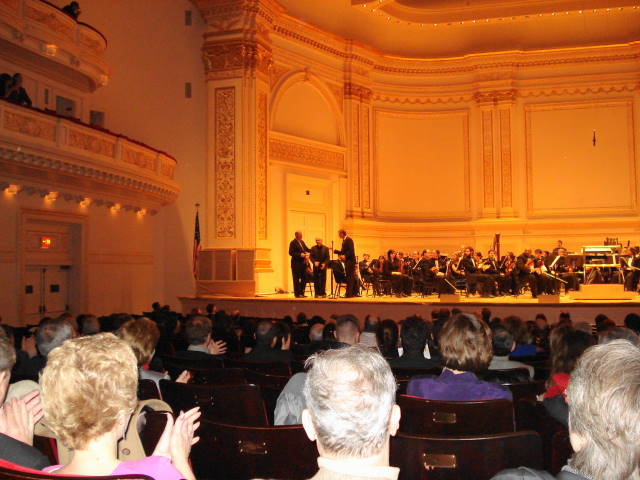Grawemeyer Concert at Carnegie Hall
The University of Louisville descended on to New York City this week for a big event, and I don’t mean the Big East tournament (well, they did that also and lost). Musicians from the School of Music, the symphony orchestra and wind symphony, filled Carnegie Hall with music from Grawemeyer-winning composers and the 2007 Grawemeyer winner.
To begin the concert, the University of Louisville Symphony Orchestra, conducted by Kimcherie Lloyd, presented two very distinct works by Witold Lutoslawski (1913-1994) and Aaron Jay Kernis (b. 1960). Fanfare for Louisville by Lutoslawski surrounded the concert stage with brass, winds and percussion in a blast of loud tone clusters and improvisatory passages for brass. To contrast, Aaron Kernis’s Musica Celestis for string orchestra painted the hall with lush chords and slow moving harmonies.
The largest work of the night invoked the sublime talents of Paul York, as cello soloist in the concerto by Karel Husa (b. 1921), one of the composers present at the concert. Beginning with an extended aria for all cellos (in the very low register), the soloist gradually separates from the section as an independent voice. The highlight of virtuosity comes in the second movement, which asks the cellist to perform for an extended time pizzicato (Instead of a bow, using fingers to pluck and strum). Unfortunately, it was interrupted by a string popping on Mr. York’s cello. He recovered magnificently, returning with a fresh string and beginning the movement over. The entire concerto concludes in the highest registers, implying a rise from the depths to hope and freedom.
Following Husa’s concerto, the Dean of the School of Music, Christopher Doane and President of the University of Louisville, James Ramsey introduced the 2007 Grawemeyer winner Sebastian Currier for his chamber work Static. Not unlike other award ceremonies, the announcement was made with a tad bit of suspense, followed by gasps (positive ones) and immediately by cheers and applause, from what seemed to be a fan base up in the tiers. Following the announcement, the University Symphony Orchestra performed Currier’s Microsymph.
The second half of the concert, featuring the Wind Symphony, conducted by Fred Speck, began with Joan Tower’s (b. 1938) Fascinating Ribbons, followed by two works for antiphonal brass, played without pause, by Krzystof Penderecki (b. 1933) and Toru Takemitsu (1930-1996). Karel Husa returned to the program by way of a premiere of Cheetah, commissioned by the University of Louisville Division of Music Theory and Composition. As one would expect, the title evokes this “magnificent wild animal, now an endangered species – it’s colors, movements, power, speed…” Considered by many to be one of the greatest composers for the wind ensemble genre, Karel Husa’s Cheetah lives up to its creators reputation. Fred Speck’s energy and momentum concluded the concert with a gripping interpretation of John Corigliano’s (b. 1938) Tarantella from Symphony No. 1 (arranged for wind symphony by Jeffrey Gershman). This musical description of John Corigliano’s friend moving through madness and lucidity, as a result of AIDS dementia, is powerful as music, but even more so because of the subject matter. Thunderous applause from a captivated audience greeted Mr. Speck and Mr. Corigliano, proof of both performer’s and composer’s ability to move listeners.
Congratulations to Mr Currier on this achievement! I recall hearing — an enjoying — both his duo for violin and piano, “Clockwork;” which won a Kennedy Center Friedheim Award back during the Golden Age when the National Center hosted that award for chamber or orchestral music, as well as his “Microsymph”, which I heard the National Symphony Orchestra perform, under Hugh Wolff (I’m virtually sure), a half a decade or so ago when the NSO would lead off a late January concert with a contemporary work.
I’m glad to see more American contemporary musical works winning this prize, given that the Grawemeyer Award (an international award), in my opinion, more often correlates with musical and artistic achievement than does the annual Pulitzer Prize winning music composition.